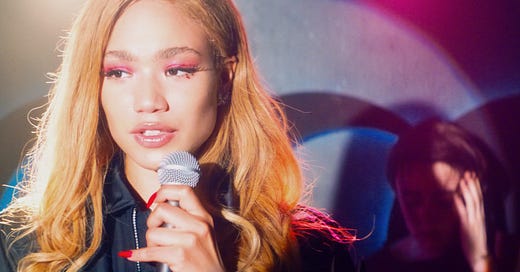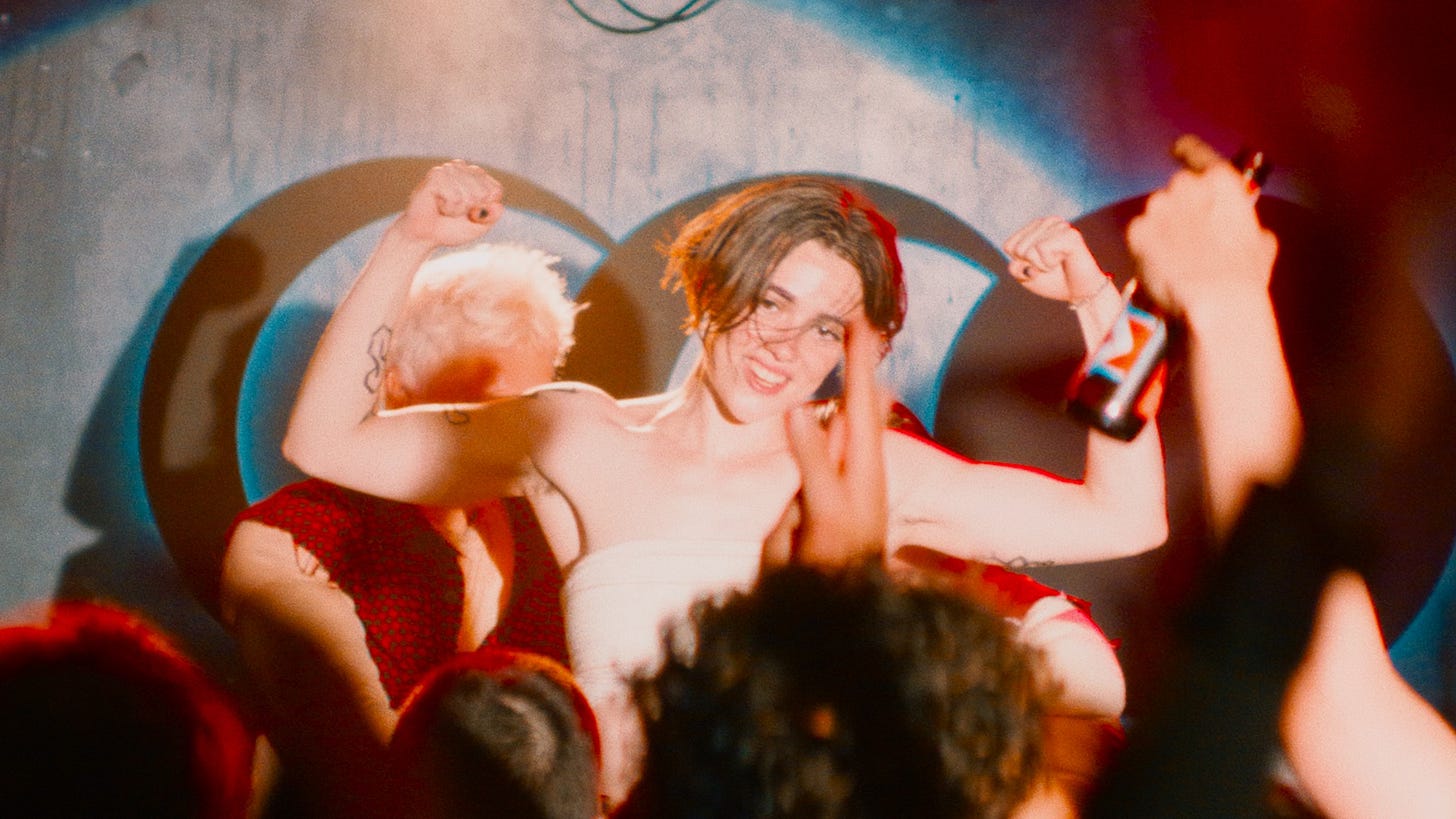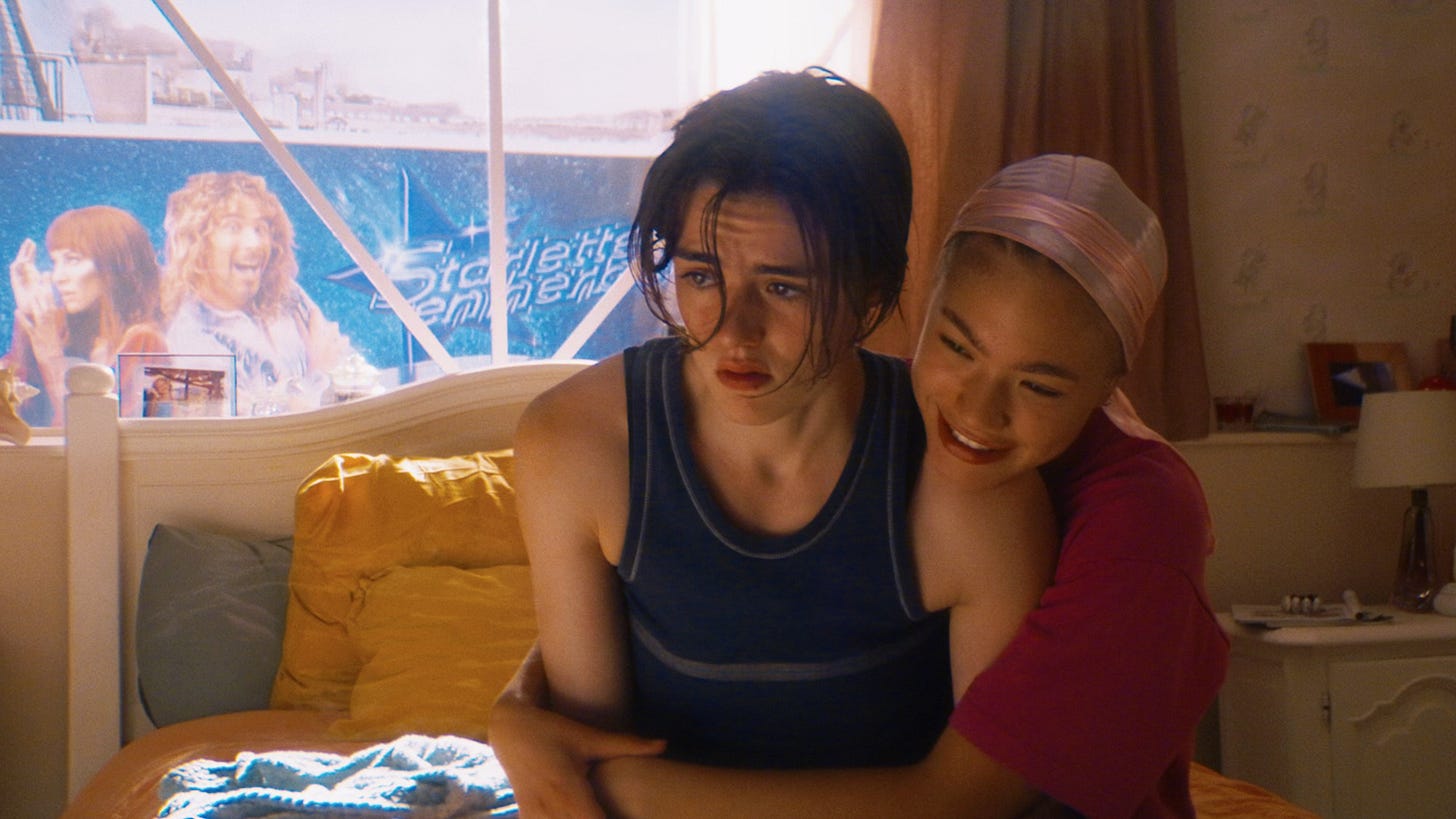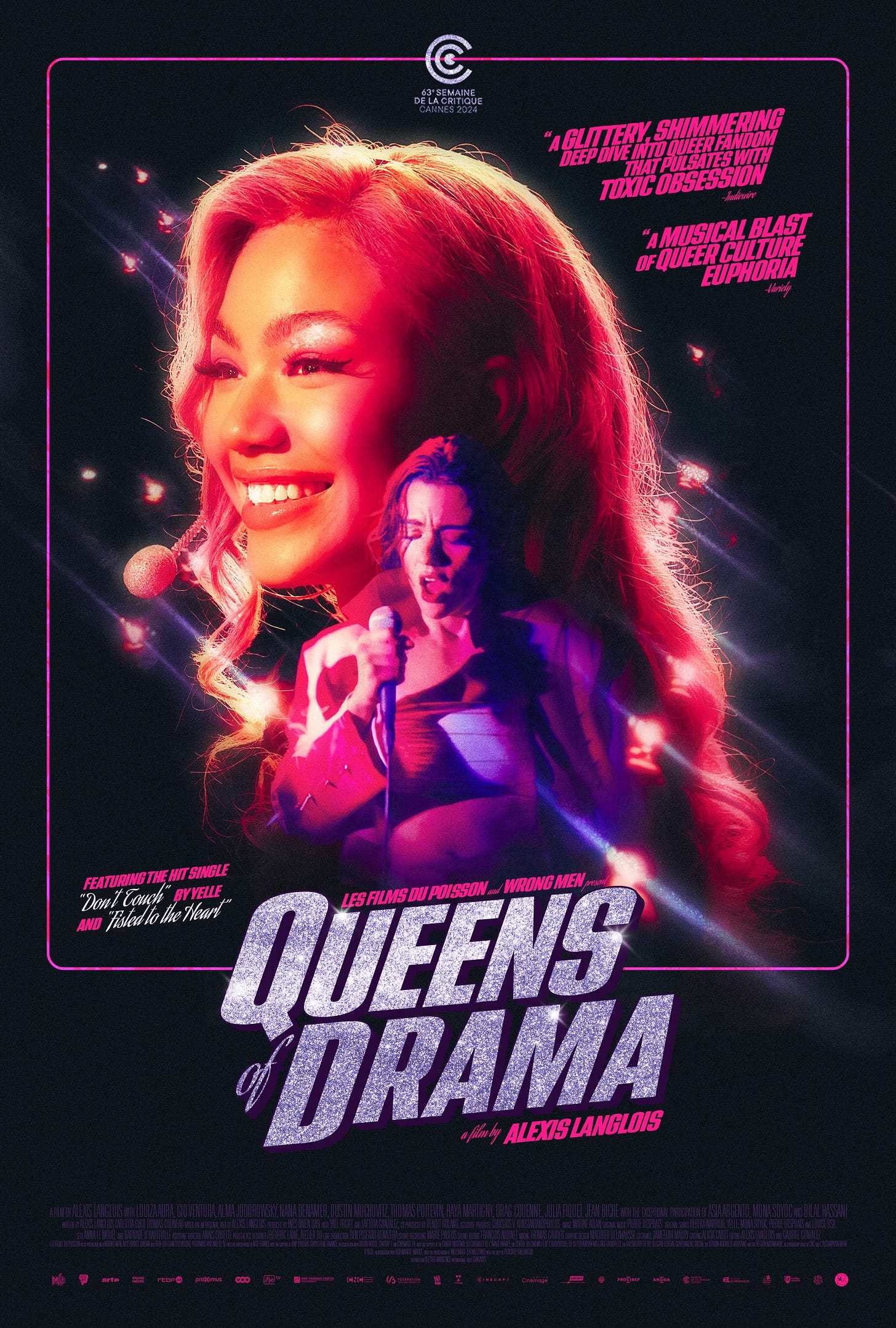'Queens of Drama' and Notes on Theatricality
Gender is performance, but emotions are a full-scale production
Queens of Drama is a French Cannes darling that I was fortunate enough to receive a screener for, and I believe it to be the utmost poetry that, as I’m sitting down to write this, we’re less than half an hour out from the Federal Leaders’ French-Language debate of this particular Canadian electoral cycle.1 This belief, not because of the Frenchness of these two things, but because “queens of drama” also happens to be an apt descriptor for the Canadian political circus.
I have little doubt that my country’s next Prime Minister will be elected on the basis of who has the best gameplan for Donald Trump. I’m in favour of that being the deciding factor, but I also think it’s a supremely depressing reminder of the empty-calorie political proceedings here, which are primarily defined by the fact that if voting actually did anything in this country, it would be made illegal.
Anyway, Queens of Drama — directed by Alexis Langlois — stars Louiza Aura and Gio Ventura as Mimi and Billie, two wannabe singers who fall in love after meeting at a talent competition a la America’s Got Talent. Diva-in-the-making Mimi gets a bit luckier than the loud and rebellious Billie in that regard, and embarks on a glitzy career that puts a strain on her relationship with Billie, who later finds success as a punk rocker. A years-long, exorbitantly passionate rivalry ensues.
These characters harbour the spiciest, most melodramatic personalities I’ve seen in quite some time. An overwhelming majority of the interactions here — be it character-to-character or us simply watching these characters do their thing — are loaded with some of the most mythically-articulated emotions this side of Warped Tour. Fights start over nothing and then end because of nothing, and many expressions of passion are caked up with extreme verbal imagery. On top of this, Queens of Drama is a musical film, so this precedence for excessive expression is baked right into the genre.
To that last point, all of this excess is intentional. We’re meant to understand these interactions as obtusely histrionic, and upon doing so, one can further observe how the film coalesces themes of queerness, adolescence, and the dark side of cultural pedigree into a scrumptious thesis statement:
If we feel certain emotions deeply enough to intellectualize and embody them as dramatically as this, is that not proof in the pudding that they’re the most real things about ourselves, insofar as they represent our ability to leave an impression on the world around us with our unique human experience as our tool?
Moreover, what happens when we lose ownership over the impression we leave, and how does the degree of ownership (and therefore authenticity) change the way in which the impression is received?
So, how does this thesis take shape?
Well, first of all, Billie and Mimi are, in essence, still teenagers when they meet for the first time, which is the age at which you most intensely experience the world.
Think about it; you’re still within arms’ reach of childhood, and so everything — and I literally mean everything — is still effectively at its maximum potential to inflict wonder and terror, but you’re also old enough to grasp emotional and worldly complexities with a relatively mature literacy. With a combination like that, of course your relationship with your girlfriend feels like an epic poem that must take the form of a guttural scream, especially when you don’t have very much to compare it to yet.
But what Queens of Drama wants us to get through our heads is that these intense emotions aren’t actually exaggerated or melodramatic at all — they’re as real as the ground we walk upon, and it wants us to embrace the freedom and catharsis that such a carnal release can bring us.
One way the film does this is by pairing the more antagonistic forces with the essence of denial. Billie whips out some punk lyrics for her audition at the beginning of the film, which one of the judges disdainfully responds to by saying “there’s no such thing as patriarchy.” When Mimi is outed on a talk show, her mother demands to be told that Mimi’s queerness isn’t true. All of this denial — this suppression, this dismissal, this downplaying — while the film as a whole is defined by an extravagant, unshackled flourish.
Extravagance, of course, being the most honest possible rendering of the human experience, because what is extravagance if not the human experience being taken full advantage of?
Singing, dancing, laughing, fucking, crying, screaming, flaunting... This is the human experience at its most communicative — at its most observable, impressionable, and impactful.
And all of those things are driven by the emotions that Queens of Drama advocates for the unfiltered, messy release of — emotions that we all express in our own unique (and therefore precious) ways.
It’s of course no great mystery how this ties into queer storytelling nuances beyond the sapphic relationship at the heart of the film. Indeed, the gutting loneliness that’s so common to the queer experience is a prime fuse for the ostentatious release of these intense emotions — when you’re constantly dealing with the shadow of relatively scarce intimacy, the fear and anguish surrounding a relationship’s deterioration might as well be a literal black hole, to paraphrase Billie. Nothing overreactive here at all.
Meanwhile, our heroines are constantly faced with the pressure of — if not being forced into — suppression. Suppression, being the storied, relentless, but ultimately futile enemy of us queers.
A younger Billie — armed with an aggressive musical style none too different from the intensity we see throughout the film — can only find an audience underground, while Mimi must tearfully keep her relationship with Billie a secret so as to keep her pop-star career going.
This brings us to the most fascinating parallel in the entire film — that being between these very personal and palpable tidal waves of emotional release, and the phenomenon of being the hot new celebrity. These two things share common ground in the form of excess, but:
While Billie readily and unashamedly eats, sleeps, and breathes her emotional excess while not really needing to worry about who’s watching (partly because the people who do watch her are here for that sort of thing)…
…Mimi is visibly detached from — if not tormented by — the glittery, excessive commercial image that she’s forced to inhabit for her rabid fandom.
Clearly, then, it’s not simply excess for the sake of excess that’s being touted as a virtue. And indeed, there also comes a point where Billie’s intensity leads her down a destructive path wherein she becomes harmful to Mimi, causing Mimi to leave the relationship.
Billie then channels her newfound despair into another Gerard Way-coded power ballad, which eventually leads to her own celebrity status — a life that, like Mimi, she finds unfulfilling, but that, unlike Mimi, she publicly acknowledges as such.
So now, we’re dealing with three shades of excess:
The excess of celebrity life and culture, which is of course framed as artificial and empty (because why wouldn’t it be?). We see this through Mimi, and later in Billie when her award acceptance speech is all about how hollow she feels.
Destructive emotional excess, where strong emotions begin to define your actions and sense of purpose, often with a perceived loss of control and hope. We see this in Billie’s abusive outburst.
Cathartic emotional excess, where you scream mythical lyrics into a microphone because they encapsulate your emotional experience, and it’s therefore pertinent that they exist.
Of these three expressions, Queens of Drama is of course only a proponent of that last one — an expression defined by the concentrated release of passion that doesn’t seek to control, but to simply be free. Freedom, in this case, means allowing those cartoonish emotions to colour the human experience exactly as they were meant to.
This, while warning against passion and excess that emotionally consumes/destroys you and the people around you, or that otherwise disregards honest, fruitful, cathartic, and productive emotion as the main priority of that excess.
That’s right, folks — all the world’s a stage, and Queens of Drama wants you to be the queen of your drama.
Sticking to the topics of queerness, Frenchness, and drama, I want to bookend this piece by bringing it back to the Canadian French-Language debate, which was succeeded by a brief period for media follow-up questions.
One of these questions — posed to Liberal Party leader Mark Carney by True North, a right-wing media outlet — was how many genders there are, and if biological women have the right to their own spaces.
Carney’s answer didn’t interest me, but I — a trans woman — want to offer my perspective on this, which is one that I have yet to see voiced by anyone else.
Folks, there is very little that terrifies me quite as uniquely as entering a public women’s washroom. I know the narratives that get spun — are presently being spun — about trans women; how we’re all a bunch of perverts and pedophiles trying to sneak into these spaces and get off. I know that all it takes is one bad actor in that space to cry wolf to land in me in hot water2, and I wouldn’t be so naive to assume that my side of the story (i.e. literally just washing my hands) would be given equal or greater weight in that situation.
In that sense, I’m more than okay with cis women having exclusive spaces, so long as trans women (and trans people, more broadly) are guaranteed exclusive spaces, too. Because if I’m terrified of women’s restrooms, you can imagine the undiluted panic I associate with the thought of entering a men’s washroom.
But the proponents of exclusive spaces for cis women aren’t concerned about what actually happens to trans people as a result, because the actual goal of this outcry is to push us out of reality entirely. When J. K. Rowling tweets about that one trans prisoner who assaulted other prisoners in a women’s prison, she seems to be doing it out of concern for cis female inmates, but she is not giving an ounce of thought to what her ideal prison reform would mean for the trans women inmates who’d get sent to a men’s prison — she’s pushing a narrative to the tune of “The perceived sense of safety of cis women is more important than the actual safety of trans women.”
Which brings me back to my point — this is not a zero-sum game of real and/or imagined safety. Every woman involved — cis and trans — can be and feel safe here if the push was for mandated gender-neutral or trans-exclusive washrooms. I would very happily avoid cis women’s bathrooms if I could always count on a gender-neutral or trans-exclusive washroom being available to me. In fact, I would happily avoid all cis women’s spaces if I could always count on gender-neutral or trans-exclusive spaces for me to go instead.
Except, if those spaces ever became a widespread thing, the Rowlings of the world would find new ways to demonize trans people, and they would try their damnedest to center that demonization around their grossly sensationalized fear for their own safety3. Then, people like me would strategically compromise and compromise until they’re forced to admit that they just absolutely, positively loathe trans people, and that they simply wanted us erased from their sight so that they didn’t have to confront the discomfort and insecurity they have towards — and because of — their limited perception of the world.
So that’s why I believe cis women should have their own, exclusive spaces — not just because I would personally feel more comfortable in a gender-neutral or trans-exclusive washroom, but because, at some point, the Rowlings of the world will run out of curtains and be forced to admit that their rhetoric is primarily driven by bigoted disgust, and putting an end to the bathroom debate (quite easily, may I add) would remove one of their favourite cards.
And let it be known, dear reader, that I do intend on being alive for the day that this rhetoric fully, completely exposes itself for what it is. Upon such a time, I will indulge a smattering of schadenfreude from the squirming of cowards reckoning with their cowardice, and then reach a forgiving hand out to those who are committed to well and truly being better — to being the queens of their own drama.
As I’m posting this, it was a couple days ago.
And that’s just worst-case scenario. I’m always holding my breath for some form of harassment.
Remember that second shade of excess I mentioned earlier?








